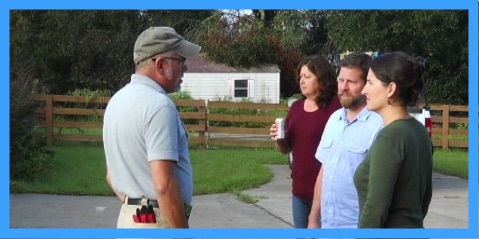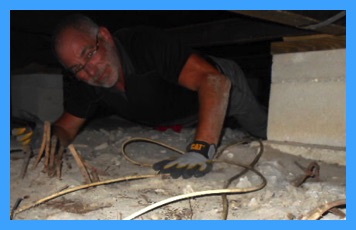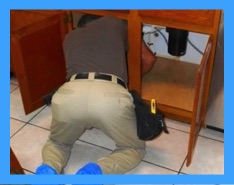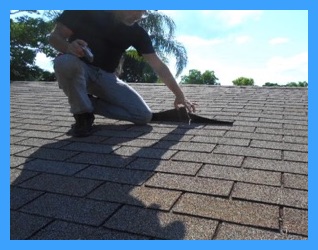so you can hear and see our findings first hand, but it is not absolutelynecessary. The detailed report, with reference photos and cost estimates for repairs, is delivered next business-day by email.
We recognize that many of our customers are about to commit a large chunk of their savings plus about 30% of their future income for a home mortgage, and depend on us to determine that the condition of their new house is satisfactory.
what we do
for you
McGarry and Madsen Inspection

A typical home inspection will take about two hours, and both Richard and Greg will be doing your inspection. We prefer that you attend the inspection if possible,
Here are some of the items we check during
your inspection:
Exterior. We check the home’s exterior including slope of site around home, retaining walls, fences, testing gates, driveways and walkways, decks and patios, porches and porch structures (including foundations and mechanical connections), steps and stairs, walls, trim, fascia and soffit, doors, windows, and trim. We note proximity of trees and tree roots, and also look at adjoining properties for similar conditions.
Structure. We do a complete visual inspection of the entire structure. The inspectors look for signs of moisture intrusion at walls, windows, and eaves, and evaluate cracks and other visible structural defects. An infrared camera and moisture meter is used as part of this process.
Crawl Space. The inspectors will enter the crawl space in accessible areas and examine foundation piers, belly board, marriage line, tie-downs, structural connections, beams, exposed utilities, insulation, ventilation, and check for signs of moisture or insect damage.

Interior Rooms. We walk through all interior rooms and check for signs of water damage or other problems. The inspector also tests all windows and doors, and examines screens. We briefly test any major appliances that convey with the sale.
Attic. Nothing to see here. Mobile homes don't have an attic.
Roof. The condition of the roof is the #1 concern of most homebuyers. We walk the roof where possible, and report on the condition, estimated age, and any observable defects. For asphalt shingle roofs, we inspect for correct slope, granule loss, and tab adhesion. We examine flashings for proper installation at skylights, roof-to-wall junctions, chimneys, and roof edge.
We determine if electric service masts
and plumbing vent pipes are properly
waterproofed. We check for correct panel
installation on metal roofs, including edge
overhang, penetration waterproofing, screw
spacing, and dissimilar metals. We estimate
the age of the roof and its likely additional
life. We check for evidence of poor
drainage, leakage, and debris in gutters and downspouts.
Electrical. We open the cover on the main electrical panel to check
for signs of defective or amateur wiring. We also check
wiring and fixtures throughout the house with a circuit analyzer and report ungrounded or reverse polarity outlets, defective or damaged wiring, and test ground-fault-circuit-interrupters, switches, smoke alarms and ceiling fans. AFCIs and GFCIs are tested.
Plumbing. We check the water supply, waste, and vent pipes for signs of leaking or other defects. We check the water heater for safety
issues and signs of trouble, and determine it’s age, capacity, and condition. We confirm that the water pressure is sufficient for normal use, and check kitchen and bath fixtures for proper operation or damage. A gas leak detector is used to check accessible gas lines and appliances.

Air Conditioning and Heating. We operate the system, check filters, ducts and registers, test it for proper installation and operation, and
determine age, capacity, and condition of system.
Appliances. We examine and test all major laundry and kitchen appliances that are installed and convey with the sale, running them through a short cycle and checking safety features.
(352) 283-1385

McGarry and Madsen Inspection • 16822 SE 92nd Danna Avenue • The Villages, Florida 32162
(352) 283-1385 • (352) 494-2437 • mcgarryandmadsen@mac.com
We serve The Villages, Stonecrest, Spruce Creek, South Ocala, Summerfield, Belleview, Lady Lake, Fruitland Park, and Wildwood
